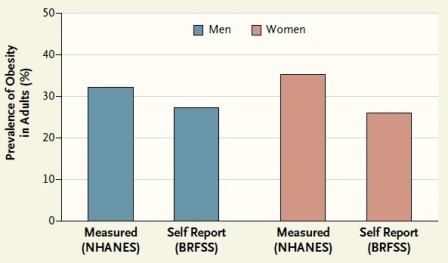Would the last thin American turn out the light?
Is obesity in the United States going up, down, or nowhere much at all? It depends on which of the surveys you believe.
Data from the Behavioral Risk Factor Surveillance System of the Centers for Disease Control and Prevention (BRFSS) show continued growth in obesity among adults, at a rate of 1.1 per cent a year. That is an extra 2.4 million obese adults a year. If these trends are real and continuing, by 2050 there will hardly be a thin person left in the US.
But other datasets paint a different picture, as Drs Susan and Jack Yanovski report in today’s New England Journal of Medicine. Data from the National Health and Nutrition Examination Survey (NHANES, also from CDC) show that the trend is flat. Though higher than BRFSS measures (see chart), obesity rates among women (35.5 per cent) and children aged 2-19 (16.9 per cent) in NHANES have remained stable for a decade and the prevalence among men (32.2 per cent) hasn’t changed since 2003.
Which to believe? Both are from unimpeachable sources - the same source, indeed - but there is a vital difference. The BRFSS set that shows obesity continuing to increase is based on self-assessment, while the NHANES data come from actual measurements, albeit of a much smaller sample.
People asked to give their height and weight often exaggerate the former and underestimate the latter, leading to lower body mass indices (BMI) than they really possess. The tape and the scales do not lie. So the NHANES data showing stable levels of obesity may be more trustworthy.
There is one snag with this neat explanation. If people under-report their weight and over-report their height in the BRFSS, why does the time series of BRFSS data show increasing obesity rates? It looks as if the respondents’ fibs are getting smaller, whatever is happening to their bodies. Fewer are lying, or at least telling smaller lies, to put it crudely.
Or so the Yanovskis (both from the National Institutes of Health in Bethesda, Maryland) argue in NEJM. Convinced that obesity is a threat to health, fatter Americans have begun to acknowledge more honestly how fat they actually are, creating the illusion that obesity in increasing when actually it is their inexactitudes that are diminishing.
Good news if true, though it still leaves a big health problem. However, it would be nice to think that it’s a problem that may not actually be getting any worse.




